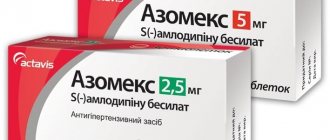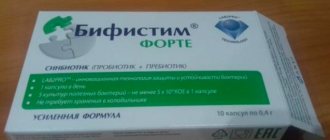Nosological classification (ICD-10)
- G45 Transient transient cerebral ischemic attacks [attacks] and related syndromes
- I20 Angina [angina pectoris]
- I20.0 Unstable angina
- I21 Acute myocardial infarction
- I22 Recurrent myocardial infarction
- I26 Pulmonary embolism
- I63 Cerebral infarction
- I82 Embolism and thrombosis of other veins
- Z100* CLASS XXII Surgical practice
- Z95.1 Presence of coronary artery bypass graft
- Z95.5 Presence of coronary angioplasty implant and graft
CardiASK®
When used simultaneously, CardiASK® enhances the effect of the following drugs:
- methotrexate, by reducing renal clearance and displacing it from association with plasma proteins; combined use increases the incidence of side effects from the hematopoietic organs; the use of the drug with methotrexate is contraindicated if the dose of the latter exceeds 15 mg per week; and possibly with caution at methotrexate doses less than 15 mg per week;
- heparin, indirect anticoagulants, due to disruption of platelet function and displacement of indirect anticoagulants from connection with plasma proteins;
- when used simultaneously with anticoagulants, thrombolytic and antiplatelet agents, the risk of bleeding increases; in addition, the damaging effect on the mucous membrane of the gastrointestinal tract increases;
- selective serotonin reuptake inhibitors, which may lead to an increased risk of gastrointestinal bleeding;
- digoxin due to a decrease in its renal excretion, which can lead to an overdose;
- hypoglycemic drugs for oral administration and insulin due to the displacement of sulfonylurea derivatives and binding to blood plasma proteins;
- when used simultaneously with valproic acid, its toxicity increases due to displacement from the connection with blood plasma proteins;
- NSAIDs and salicylic acid derivatives in high doses increase the risk of ulcerogenic effect and bleeding from the gastrointestinal tract;
- ethanol (alcoholic beverages), increases the risk of damage to the gastrointestinal mucosa and prolongation of bleeding time as a result of synergistic action.
If it is necessary to use ASA simultaneously with the listed drugs, the need to reduce the dose of these drugs should be considered.
ASA reduces the effect of the following drugs:
- any diuretics (glomerular filtration rate decreases);
- angiotensin-converting enzyme (ACE) inhibitors (a dose-dependent decrease in glomerular filtration rate is noted, resulting in a weakening of the hypotensive effect), a clinically significant decrease in glomerular filtration rate is observed with a daily dose of ASA more than 160 mg; in addition, the positive cardioprotective effect of ACE inhibitors in the treatment of chronic heart failure is reduced.
- drugs with uricosuric action (benzbromarone, sulfinpyrazone, probenecid). If it is necessary to use ASA simultaneously with these drugs, their dose must be adjusted.
When used simultaneously with ibuprofen, antagonism is observed against the irreversible platelet inhibition caused by the action of ASA, which leads to a decrease in the cardioprotective effects of ASA. The combination of ASA with ibuprofen is not recommended in patients with an increased risk of cardiovascular disease.
When used simultaneously with systemic glucocorticosteroids (GCS), with the exception of GCS used for replacement therapy of Addison's disease, there is an increase in the elimination of salicylates and, accordingly, a weakening of their effect.
Compound
| Enteric film-coated tablets | 1 table |
| active substance: | |
| acetylsalicylic acid | 50 mg |
| 100 mg | |
| excipients: stearic acid; corn starch; lactose monohydrate (milk sugar); hydrogenated castor oil; povidone (plasdon K90 or collidon 90F); polysorbate (tween 80); MCC | |
| film shell: methacrylic acid and ethyl acrylate copolymer 1:1 (collicut MAE 100P); macrogol and polyvinyl alcohol copolymer (collicut IR); copovidon (plasdon S630); triethyl citrate; talc; titanium dioxide |
CardiASK® (CardiASK)
When used simultaneously, CardiASK® enhances the effect of the following medications ; if necessary, use with the listed drugs should consider the need to reduce the dose of these drugs:
- methotrexate by reducing renal clearance and displacing it from connection with blood plasma proteins (increasing the incidence of side effects of methotrexate on the part of the hematopoietic organs);
- anticoagulants of indirect action due to the displacement of the latter from connection with blood plasma proteins;
- when used simultaneously with anticoagulants, thrombolytic and other antiplatelet drugs (ticlopidine, clopidogrel), there is an increased risk of bleeding as a result of the synergism of the main therapeutic effects of the drugs used;
- when used simultaneously with drugs that have anticoagulant, thrombolytic or antiplatelet effects, there is an increased damaging effect on the mucous membrane of the gastrointestinal tract;
- selective serotonin reuptake inhibitors, which may lead to an increased risk of bleeding from the upper gastrointestinal tract (synergism with acetylsalicylic acid);
- digoxin, due to a decrease in its renal excretion, which can lead to an overdose;
- hypoglycemic agents for oral administration (sulfonylurea derivatives) and insulin due to the hypoglycemic properties of acetylsalicylic acid itself in high doses and displacing sulfonylurea derivatives from association with blood plasma proteins;
- when used simultaneously with valproic acid, its toxicity increases due to its displacement from connection with blood plasma proteins.
- NSAIDs (including ibuprofen and naproxen) and salicylic acid derivatives in high doses (increased risk of ulcerogenic effect and bleeding from the gastrointestinal tract as a result of synergistic action); with simultaneous (within one day) use with ibuprofen and naproxen, antagonism is observed in relation to irreversible platelet inhibition caused by the action of acetylsalicylic acid. The clinical significance of this effect is unknown. The combination of acetylsalicylic acid with ibuprofen is not recommended in patients at high risk of cardiovascular disease due to a possible decrease in the cardioprotective effects of acetylsalicylic acid;
- ethanol (increased risk of damage to the mucous membrane of the gastrointestinal tract and prolongation of bleeding time as a result of the mutual enhancement of the effects of acetylsalicylic acid and ethanol).
The simultaneous use of acetylsalicylic acid in high doses may weaken the effect of the drugs listed below ; If it is necessary to simultaneously prescribe acetylsalicylic acid with the listed drugs, you should consider the need to adjust the dose of the listed drugs:
- any diuretics (when used together with acetylsalicylic acid in high doses, a decrease in glomerular filtration rate is observed as a result of a decrease in the synthesis of prostaglandins in the kidneys);
- angiotensin-converting enzyme inhibitors (a dose-dependent decrease in the glomerular filtration rate is noted as a result of inhibition of prostaglandins that have a vasodilatory effect, respectively, a weakening of the hypotensive effect. A clinically significant decrease in the glomerular filtration rate is observed with a daily dose of acetylsalicylic acid of more than 160 mg. In addition, there is a decrease in the positive cardioprotective effect angiotensin-converting enzyme inhibitors prescribed to patients for the treatment of chronic heart failure. This effect is also manifested when used in conjunction with acetylsalicylic acid in high doses);
- drugs with uricosuric action - benzbromarone, probenecid (reduced uricosuric effect due to competitive suppression of renal tubular excretion of uric acid;
- when used simultaneously with systemic glucocorticosteroids (with the exception of hydrocortisone or other glucocorticosteroids used for replacement therapy of Addison's disease), there is an increase in the excretion of salicylates and, accordingly, a weakening of their effect;
- indomethacin, piroxicam due to a decrease in plasma concentration.
With simultaneous use, antacids containing magnesium and/or aluminum hydroxide slow down and reduce the absorption of acetylsalicylic acid.
With the simultaneous use of blockers of “slow” calcium channels, agents that limit the intake of calcium or increase the excretion of calcium from the body, the risk of bleeding increases.
When used simultaneously with acetylsalicylic acid, the effect of phenytoin is enhanced.
When used simultaneously with glucocorticosteroids, the risk of ulcerogenic effects and gastrointestinal bleeding increases.
When used simultaneously with gold preparations, acetylsalicylic acid can induce liver damage.
If you are using the above or other medications (including over-the-counter medications), consult your doctor before using CardiASK®.
Directions for use and doses
Orally, before meals, with plenty of liquid, 1 time per day. CardiASK® is intended for long-term use. The duration of therapy is determined by the attending physician.
Primary prevention of acute myocardial infarction in the presence of risk factors: 50–100 mg/day.
Prevention of recurrent myocardial infarction, stable and unstable angina: 50–100 mg/day.
Unstable angina (if acute myocardial infarction is suspected): 50–100 mg/day.
Prevention of ischemic stroke and transient cerebrovascular accident: 50–100 mg/day.
Prevention of thromboembolism after operations and invasive interventions on blood vessels: 50–100 mg/day.
Prevention of deep vein thrombosis and thromboembolism of the pulmonary artery and its branches: 50–100 mg/day.
CardiASK Tablets, box, 30 pcs., 100 mg, for oral administration, film-coated
Overdose
Salicylate intoxication (develops when taking ASA at a dose of more than 100 mg/kg/day for more than 2 days) can result from prolonged use of toxic doses of the drug as part of improper therapeutic use of the drug (chronic intoxication) or a single accidental or intentional intake of a toxic dose of the drug adults or children (acute intoxication).
Symptoms of chronic intoxication with salicylic acid derivatives are nonspecific and are often difficult to diagnose. Mild intoxication usually develops only after repeated use of large doses of the drug and is manifested by dizziness, tinnitus, hearing loss, increased sweating, nausea and vomiting, headache and confusion. These symptoms disappear after reducing the dose of the drug. Tinnitus may appear when the concentration of ASA in the blood plasma is from 150 to 300 mcg/ml. More severe symptoms appear when plasma ASA concentrations are above 300 mcg/ml. The main manifestation of acute intoxication is a severe disturbance of the acid-base state, the manifestations of which may vary depending on the age of the patient and the severity of intoxication. In children, the most typical development is metabolic acidosis. Treatment of intoxication is carried out in accordance with accepted standards and depends on the severity of intoxication and the clinical picture and should be aimed mainly at accelerating the elimination of the drug and restoring the water-electrolyte balance and acid-base state. Overdose is especially dangerous in elderly patients.
Mild to moderate overdose symptoms:
Dizziness, tinnitus, hearing loss, increased sweating, nausea, vomiting, headache, confusion, profuse sweating, tachypnea, hyperventilation, respiratory alkalosis.
Treatment: gastric lavage, repeated intake of activated carbon, forced alkaline diuresis, restoration of water-electrolyte balance and acid-base state.
Symptoms of moderate to severe overdose:
- respiratory alkalosis with compensatory metabolic acidosis;
- hyperpyrexia (extremely high body temperature);
— respiratory disorders: hyperventilation, non-cardiogenic pulmonary edema, respiratory depression, asphyxia;
- disorders of the cardiovascular system: cardiac arrhythmias, decreased blood pressure, depression of cardiac activity;
- disturbances in water and electrolyte balance: dehydration (dehydration), impaired renal function from oliguria up to the development of renal failure, characterized by hypokalemia, hypernatremia, hyponatremia;
- impaired glucose metabolism: hyperglycemia, hypoglycemia (especially in children), ketoacidosis;
- tinnitus, deafness;
- gastrointestinal bleeding;
- hematological disorders: from inhibition of platelet aggregation to coagulopathy, prolongation of prothrombin time, hypoprothrombinemia;
- neurological disorders: toxic encephalopathy and depression of central nervous system function (drowsiness, confusion, coma, convulsions).
Treatment: immediate hospitalization in specialized departments for emergency treatment - gastric lavage, repeated intake of activated charcoal, forced alkaline diuresis, hemodialysis, restoration of water-electrolyte balance and acid-base status, symptomatic therapy.

